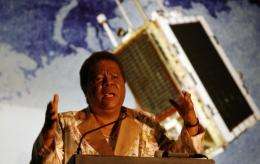South Africa's minister for science and technology Naledi Pandor unveils the national space agency on December 9, 2010 in Johannesburg. More African countries are launching satellites and taking advantage of space technology, the world's top scientists heard at a meeting marking the 50th anniversary of human space flight.
More African countries are launching satellites and taking advantage of space technology, the world's top scientists heard Monday at a meeting marking the 50th anniversary of human space flight.
The International Astronautical Federation (IAF) opened its annual conference, held for the first time in Africa, with a call for the continent to use space technology to benefit its people.
"It has always been an objective of the IAF to disseminate space knowledge to many new countries globally. It will continue to spread the notion space is not just the playground for wealthy countries," said IAF president Berndt Feuerbacher.
"It brings value and benefits to the citizens of all places of the world."
Feuerbacher highlighted last month's milestone in Nigeria's space programme with the launch of two satellites Nigeriasat 2 and Nigeriasat X, used for forestry, mapping, disaster monitoring and security applications.
South Africa in 2009 launched an environmental observation satellite called SumbandilaSat, and last year formed its own space agency. Algeria, Egypt, Kenya, Morocco and Tunisia all have their own space initiatives, he said.
"Exciting times are emerging for space in Africa," he told delegates when opening the congress.
"I am glad to see more and more African countries embracing the benefits space technology brings to their citizens."
The heads of the world's major space agencies were set to meet later Monday, while the five-day conference would also commemorate the 50th anniversary of Russian Yuri Gagarin becoming the first man in space.
The meeting will also review the major changes under way in space agencies around the world, with NASA making the last flight of the US space shuttle fleet while unveiling its new Space Launch System.
Last week China also reached a milestone in its space programme with the launch of Tiangong-1, an experimental module that marks a first step toward building a space station.
"The year 2011 is a year of major changes and amazing achievements in space," Feuerbacher said.
(c) 2011 AFP




















